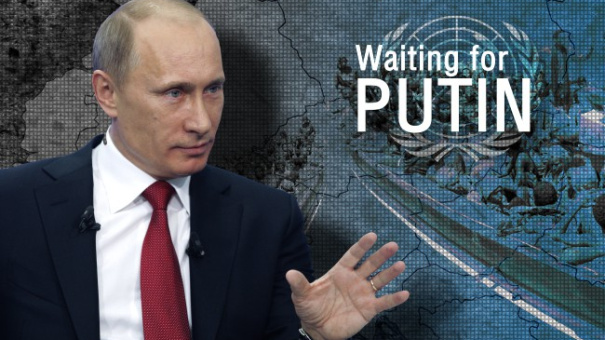UN: Waiting for Putin
Presidents Obama, Putin, Rouhani and Hollande are scheduled to address the United Nations General Assembly (UNGA) on Monday, September 28. Pope Francis will address UNGA on September 25. The presidents of Egypt, Ukraine, Venezuela address UNGA on Tuesday, 29 Sept, while the Palestinian and Iraqi presidents speak on the 30th. Israeli PM Netanyahu is currently scheduled to speak on Thursday, Oct 1. More details to come as we get closer to the UN General Assembly Debate.
Russia's president, will appear at the United Nations General Assembly for the first time in 10 years, speaking shortly after US leader Barack Obama and just before Hassan Rouhani, the Iranian president, who are all expected to set out their view of the world after this year's hard-fought nuclear deal.
Meanwhile, Washington is afraid to stay on the sidelines, if Vladimir Putin at a session of the UN General Assembly will call to create a coalition to fight against "Islamic state." So the United States are hurry to establish a dialogue with Russia before the Putin's speech in New York.
"The situation in Syria is so deadlocked that Washington is reviewing its course and goes to what a few weeks ago it was impossible to imagine: an agreement with Russia on the diplomatic and military level," - write the German magazine Spiegel, recalling that because of the Ukrainian crisis dialogue with Russia in the military sphere has been frozen, and in the case of Syria, Russia and the United States initially held opposing views.
Putin understands the weakness of the so-called Western Position. He believes that some allies of the United States are coming round to the idea that under America's bidding they were too eager to jump into the war against Assad.
The Russian leader believes that after four years bloodletting, allies of the US believe that the rebel leaders are not to be trusted, that there is questionable common leadership among them and that should they ever overthrow Assad then little would achieved but another Libya.
Putin on the other hand is building a military stronghold in Syria in support of Assad. It reinforces his position before the speech on 28 September. Such a move has not been seen since the Soviet Union in the 1970s when the Kremlin had a similar arrangement with Egypt's President Anwar Sadat. The fact that the pact broke down and that the Soviet Union troops were told to leave matters not in the existing circumstance. Vladimir Putin is in. Without him and Iran, Assad would be done for.
Mr Putin's outline for his speech at the UN is that it would be best to support Assad and then bend a combined force against IS. That could even, initially, mean Assad falling back on the Western Provinces of Syria, regrouping and then launching a combined land-air operation on IS. Putin's generals even see this as a combined operation with the counter-IS conflict in Iraq.
The present state of US and UK thinking, plus the support of other allies including Australia who have joined the bombing campaign against Assad's forces, is that it would be an unacceptable about face. It is not even certain that the American President Barack Obama will meet with Putin.
It might be remembered that the coming weekend in New York is a major part of the 70th anniversary of the signing of the UN Charter. Vladimir Putin, who has not visited the UN General Assembly for ten years, understands the symbolism of the event. It will give him an opportunity to grandstand his plan (at home as well as abroad) and with it he hopes to get some of the adverse diplomatic and world opinion off his back.
The Russian president believes his master plan is such an obvious solution to the Syrian war. He understands also that the war is part of the great scheme to realign the 20the century origins of the Middle East and now the imagery of Sunni versus Shia. In this case Putin supposes the whole region is used to surviving by undated compromise and volte face and therefore his position has more support than publicly demonstrated.
In short, we may not see the results of public and backstairs meeting at the end of this week. But it will not be a time to write off those rarely understood meetings in the margins that mean so much at the General Assembly.
Russian President will need credible allies and so far there is none. People of Russia are hoping to put together a meeting with someone they may just rate more than Barak Obama on this occasion. Putin wants the support of the Pope.
The pontiff is already in US and will be briefly at the UN on September 28. But Pope Francis is not going to get involved in a very possible public failure as the Syrian tragedy.
What ultimately we should expect from Putin? The new "Munich speech", pragmatic dialogue or the maximum exacerbation of contradictions. Probably, Putin would not have been one of the world's most powerful politicians, if it could be predicted in advance. Soon we'll know.
